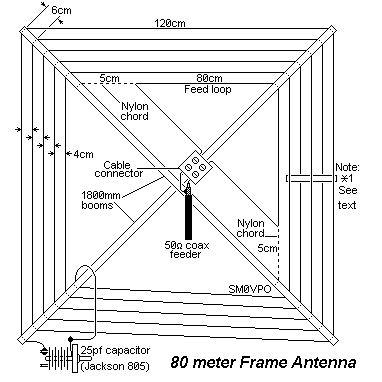

I keep on and on about my little balcony and the antenna restrictions it imposes on my HF antennas. This projects was developed as a result of experiments to become QRV on 80 meters, again, using the little balcony. I have now built several of these antennas with equal success every time. The frame antenna may not be the most efficient but it can get you QRV on 80 and is ideal for boats and holidays. The VSWR is almost 1:1 from 3.5 to 3.8 MHz. The antenna may be modified for 1.8 MHz but the efficiency may suffer.

CONSTRUCTION

The construction of the antenna is shown above and is a five turn loop of one cable from 5 ampere mains cable. The cable must have a multi-stranded conductor. The antenna uses over 20 meters of the cable, so I stripped down 7 meters of 3-core cable and soldered the ends together. Construction is otherwise quite straight forward if you follow the above drawing. Note that all cable lengths shown are approximate.
The two boom poles - I have used both cane and a plastic clad tin (metalic) pipes, of the sort that are sold in garden shops. Both worked very well in spite of the difference in materials. If you do use metal booms then insert some form of insulation in the holes before you pass wire through them. I used plastic drinking straws from MacDonalds. This will prevent the metal from digging into the cable insulation, as well as improving the insulation.
With the dimensions shown each loop will be separated by 4cm. The natural capacity between the turns will tune the antenna to (about) 4.15 MHz, just above the 80 meter band. One of those Jackson 804 / 805 VHF tuning capacitors with about 25pf will tune the antenna down to 3.45 - 3.90 MHz. The tuning capacitor MUST be one with a couple of millimeters between the plates. The antenna has a very high Q so the voltage across the capacitor will be very high, even with small QRP powers.

160 METERS
A capacitor of 410 pf placed across the tuning capacitor move the antenna frequency down to 1.9 MHz. This capacitor MUST be a high voltage type. This antenna could get you QRV on 160 meters although efficiency is likely to suffer, but Ok for local nets and the like.

TRIMMING
If the 80 meter antenna does not naturally fall on 4.15 MHz, or the tuning capacitor is not centered on the band then some frequency adjustment can be made to the final antenna.
If the frequency is a little LOW and you need to increase it then some of the self capacity must be removed. Thread a bit of plastic tube between the wires of one side; IN, OUT, IN, OUT, IN. See '*1' in FRAMEANT.GIF. Repeat on more than one side of the frame antenna if a larger frequency increase is required. If the increase is still not enough then insert two tubes in each side and slide them apart to get a large increase.
If the frequency is too HIGH and you need to decrease it then some more capacity must be added. Connect a high voltage capacitor across the variable tuning capacitor. A short length of coaxial cable is ideal. Cut the coaxial capacitor shorter to reduce to the required capacity (increase the frequency). Do not be tempted to make a 'gimmick' capacitor with two wires twisted together; it will burn, even with a couple of watts of RF. This means that you have added more losses.
Have fun, de HARRY, Upplands Vasby, Sweden,
